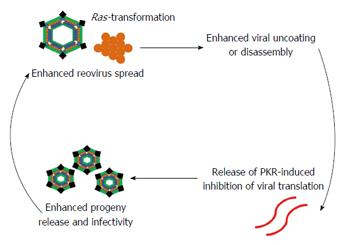Copyright
©The Author(s) 2016.
World J Methodol. Mar 26, 2016; 6(1): 25-42
Published online Mar 26, 2016. doi: 10.5662/wjm.v6.i1.25
Published online Mar 26, 2016. doi: 10.5662/wjm.v6.i1.25
Figure 1 Ras-transformation promotes reovirus preferential replication in cancer cells or oncolysis by affecting several key steps of the viral infectious life cycle.
Ras-transformation enhances viral uncoating or dissembly. dsRNA-activated protein kinase (PKR), which in the presence of viral transcripts, normally phosphorylates eukaryotic initiation factor 2α rendering it inactive and thereby leading to the inhibition of protein synthesis and viral replication, remains inactivated in Ras-transformed cells. Lastly, Ras-transformation enhances generation of viral progeny with increased infectivity, enhances release of progeny through apoptosis, and enhances viral spread in subsequent rounds of infection.
- Citation: Gong J, Sachdev E, Mita AC, Mita MM. Clinical development of reovirus for cancer therapy: An oncolytic virus with immune-mediated antitumor activity. World J Methodol 2016; 6(1): 25-42
- URL: https://www.wjgnet.com/2222-0682/full/v6/i1/25.htm
- DOI: https://dx.doi.org/10.5662/wjm.v6.i1.25









